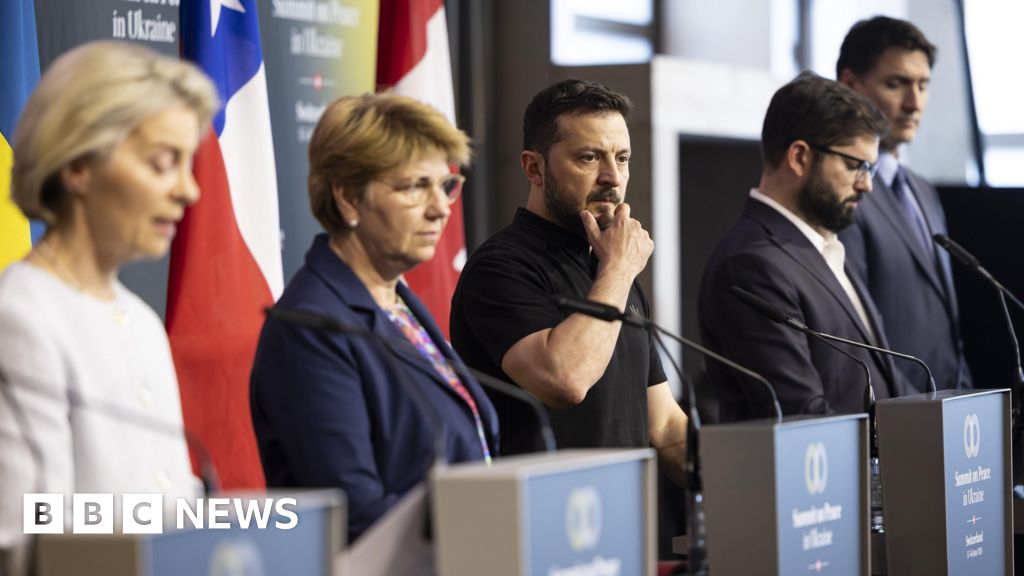- author, By Robert Green
- stock, BBC News
-
Kyiv President Volodymyr Zelensky has said that he will hold peace talks with Russia tomorrow if Moscow withdraws from all Ukrainian territory.
But speaking at the end of a peace summit in Switzerland, he said Russian President Vladimir Putin would not end the war and that it must be stopped “by any means we can”, whether through military or diplomatic means.
Western aid is not enough to win the war, but the summit showed that international support for Ukraine has not weakened.
The meeting ended with dozens of countries pledging Ukraine’s territorial integrity.
The final document was adopted, which firmly blamed Russia for the widespread suffering and destruction of the war.
However, several countries, including India, South Africa and Saudi Arabia, have not signed it.
The summit aimed to build the broadest possible support for a process that would help end the war in Ukraine.
More than 90 countries and international organizations participated in the summit.
Russia was not invited, and its biggest supporter China was not there, leaving some skeptical about the effectiveness of the summit.
Some of those gathered at Switzerland’s Bürgenstock resort were not Ukraine’s closest supporters, including Saudi Arabia, whose foreign minister has warned Ukraine will have to make tough compromises, and Kenya, which has spoken out against recent sanctions on Russia.
The final document calls for the restoration of Ukrainian control over the Zaporizhia nuclear power plant, which is currently occupied by Russia.
It also referred to Russia’s invasion as a “war”, a label rejected by Moscow.
It called for an exchange of all prisoners and the return of children abducted by Russia.
More controversial topics, such as the status of land under Russian occupation, will be left for later.
Speaking to reporters after the summit, Mr Zelensky thanked the world leaders in attendance for coming freely despite pressure from Russia to stay away.
“This summit says international support [for Ukraine] Not weakened,” he said, adding that states that had not previously engaged in diplomatic efforts were joining the process.
Asked by the BBC whether Ukraine’s fragile position on the battlefield forced him to consider diplomatic moves, he replied that this was not the case and that Ukraine had always talked about peace.
He said Moscow’s presence in the talks would demonstrate its desire for peace.
“Russia can start negotiations tomorrow if we withdraw from our territories,” he said.
Mr Zelensky also said China is not Ukraine’s enemy.
“We respect China and its territorial integrity, and we want China to do the same for us,” he said, calling on Beijing to actively engage in developing peace plans.
Earlier Dutch Prime Minister Mark Rutte said the participants were united in their quest for peace in Ukraine.
“Everyone knows that we are only at the beginning, the beginning of the road to peace,” he said.
“While some of us around this table may have different views on how best to achieve peace for Ukraine, let there be no mistake…we are completely united in a shared vision of principles, values, and dignity.
“You don’t invade another country. You don’t kidnap children. You don’t play politics with the world food supply. And you don’t endanger nuclear security.”
All delegations were expected to approve a final statement condemning Russia’s invasion, but Austrian Chancellor Karl Nehhammer told reporters on Sunday that the declaration would not be unanimously supported.
Mr Zelensky said on Saturday that the results of the Swiss summit would be communicated to Moscow “at the second peace summit where we can fix the real end of the war”.
Russia has described the Swiss event as a waste of time, and on Friday President Vladimir Putin said he would agree to a ceasefire if Russia withdrew troops from the four regions it partially occupies.
Italian Prime Minister Giorgia Meloni described it as “propaganda” and UK Prime Minister Rishi Sunak accused Mr Putin of “spinning a false narrative about his willingness to negotiate”.
Later on Sunday, Kremlin spokesman Dmitry Peskov said the Russian leader had not ruled out talks with Ukraine but would require guarantees to ensure their credibility and that Mr Zelensky could not be a participant.

